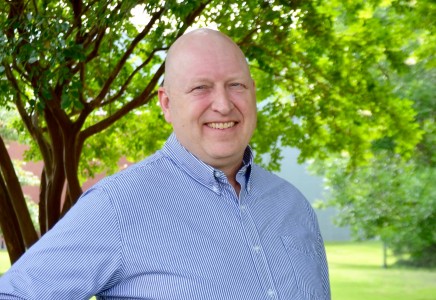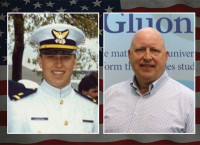
Drawn to science, technology, engineering and math, he noticed a key component of himself: “I enjoyed solving problems.”
From Coast Guard to National Lab, Dolbeck is laser focused on mission results.
Years in the Coast Guard prepared Joel Dolbeck for handling missions, from engineering storm-ready buildings to managing emergency response teams. Now, Dolbeck is looking forward to solving the missions of Jefferson Lab.
In 2008, Joel Dolbeck watched Hurricane Ike sweep through Galveston and Houston, as well as a remote Coast Guard base in the Bahamas, leaving severe damage behind. He knew rebuilding would be a hefty charge.
“We knew what it would take,” Dolbeck said. He immediately sprung into action: damage assessment, temporary facilities, planning and capitalization, managing a massive team to restore operations and ensure replacement facilities were built with resiliency. Then, Hurricane Rita hit nearly 10 years later with peak winds of 180 mph.
“I watched those facilities that we commissioned withstand another powerful storm,” Dolbeck said. “They made it through unscathed…just as we designed.”
For 30 years, Dolbeck served in the U.S. Coast Guard. His job was to watch, monitor and actively engage in base operations, facility maintenance, human performance and disaster response. He held various roles as Chief of Staff of the Force Readiness Command, Commanding Officer of Base Portsmouth, VA, Project/Acquisition Manager at the Coast Guard Headquarters, Commanding Officer of a regional Civil Engineering Command, Facility Engineer and Design Chief and Project Engineer and Construction Branch Chief and as an Assistant Professor at the Coast Guard Academy.
He said those years of experience through many roles all taught him that “preparing leads to success.”
Originally from Ticonderoga, New York, Dolbeck grew up the son of a high school teacher and construction contractor who enjoyed reading Popular Science and Popular Mechanics. Drawn to science, technology, engineering and math, he noticed a key component of himself: “I enjoyed solving problems.”
Dolbeck received a Bachelor of Science in Civil Engineering from the U.S. Coast Guard Academy while playing on the football, basketball and golf teams. Soon after followed a Master of Science Degree in Civil Engineering from the University of Illinois, and he later became certified as a Federal Acquisition Program and Project Manager. During his time studying under the Coast Guard, Dolbeck discovered a life value that informed the rest of his life: successful mission execution needs focused mission support.
“You want to leave a place better than you found it,” Dolbeck said. “You want to make the work and processes more efficient for the people who come behind you.”
Dolbeck began a thriving career with the Coast Guard. Living in California, Illinois, Connecticut, Alaska, Florida, Washington D.C. and Virginia, he packed up his belongings and family of five every two to three years to ensure the operations of the U.S. Coast Guard were successful.
“I come from a mission-support background,” Dolbeck said. “And reliability is very important.”
Dolbeck joined Jefferson Lab as the Facilities Engineer Manager June 1, bringing with him extensive experience, a tireless commitment and a readied mind to provide value to the lab’s goals.
“We want to be a center of gravity for physics research in our nation,” Dolbeck said. “Having Jefferson Lab evolve to meet the needs of science and modernizing our facility to meet that need would be great.”
Supporting the efforts for Jefferson Lab’s ion collider proposal, Dolbeck’s role includes managing a team that must balance various interests, including infrastructure, design work, and property arrangement agreements.
“We want to make sure that we have an integrated approach,” Dolbeck explained. “Our efforts need to align with scientific requirements, and at the same time, mesh with the overall plans of the state, city of Newport News and the Department of Energy.”
The challenge of understanding the needs of various parties while acknowledging both monetary, land and scientific constraints, involves a fine-tuned ear and action plan. It also involves teams of scientists and engineers working together to solve intricate problems.
“We have a close relationship with the scientists. As they mature the science, that may expand or shrink the footprint and utility requirements,” Dolbeck said. "We want to help them meet their mission with a facility that enables them to do so.”
When Dolbeck isn’t working, he’s outside in nature camping, gardening or spending time with his family.
“I like being around nature, out in the fresh air, feeding the birds or taking a hike,” Dolbeck said.
A father to three children, he enjoys spending time with his oldest son, an Eagle Scout. He helps coach his middle son and daughter in basketball and swimming, which leads to a hectic schedule that includes traveling, practices and being a loud cheerleader from the sidelines.
“It’s busy,” he said, laughing. But he adds that he wouldn’t trade it for anything.
His position at Jefferson Lab is an opportunity to provide stability for his family while still being a team member collaborating on interesting and fulfilling work.
“My family has moved with me every two to three years,” he said, noting the times his wife and children have been pulled from jobs and different schools and uprooted for his Coast Guard career. “It’s my time to give back to them.”
Dolbeck, who enjoys good sushi (especially a good volcano roll), has used science, math and listening to customers his entire life to support a long-term, broad portfolio of missions. With his family by his side and his commitment to service, he said he feels up for this new challenge.
“This is only my second job,” Dolbeck said. “But like we say in the Coast Guard…Semper Peratus…Always Ready!”


